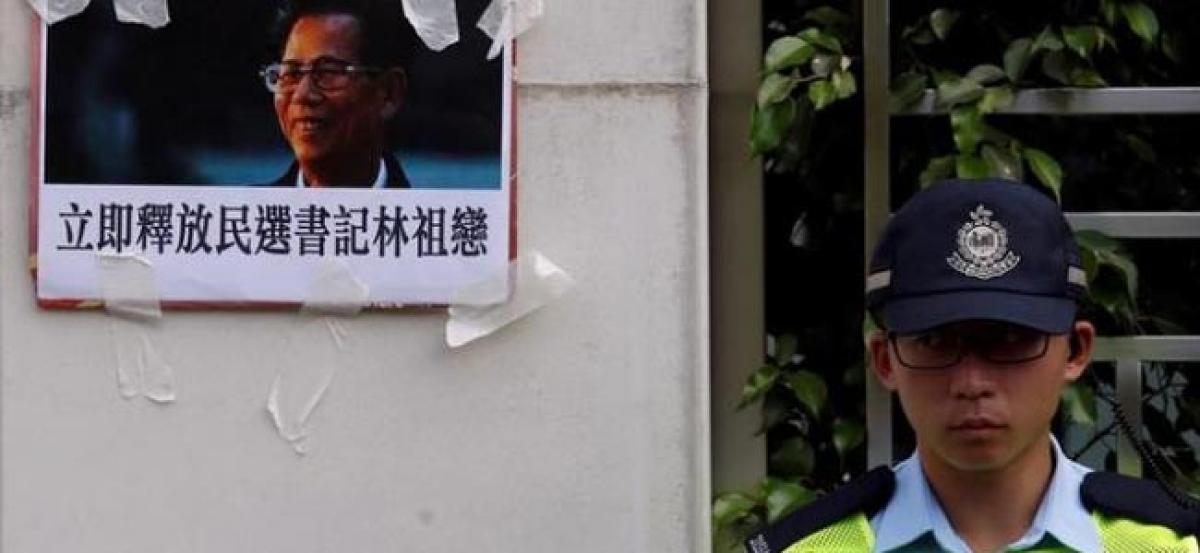Live
- NASA Tracks Five Giant Asteroids on Close Approach to Earth Today
- Pushpa 2 Hits ₹1000 Crore in 6 Days: How It Compares to Other Top Indian Films
- Vivo X200 and X200 Pro Launched in India: Price, Specifications, and Features
- Nitin Gadkari Admits Feeling Embarrassed at Global Summits Over Rising Road Accidents in India
- Opposition Slams ‘One Nation, One Election’ Bill as Anti-Democratic; BJP Allies Support the Move
- Celebrate Karthigai Maha Deepam Virtually with Sri Mandir’s LIVE Darshan Experience
- BJP Extends Support to Samagra Shiksha Abhiyan Employees' Strike, Demands Immediate Regularization and Welfare Benefits
- Dr. M. Priyanka Stresses Quality Education, Nutritious Meals, and Cleanliness in Schools
- Mandal Level CM Cup Sports Concludes in Ija with Promising Talent and Enthusiastic Participation
- Harish Rao Slams Revanth Reddy: "More Talk, Less Action"
Just In

When the first wave of riot police swept into the southern Chinese \"democracy village\" of Wukan shortly after 3am Tuesday, some breaking through gates with wooden battering rams, frightened residents sounded gongs to raise the alarm.
When the first wave of riot police swept into the southern Chinese "democracy village" of Wukan shortly after 3am Tuesday, some breaking through gates with wooden battering rams, frightened residents sounded gongs to raise the alarm.
The gongs are now silent, and for the first time in nearly three months, Wukan's streets are closed to protest as anti-riot squads seal the area and sever communications.
With dozens of villagers detained and arrested after running skirmishes with police, local authorities appear determined to keep it that way. That could finally end an extraordinary five-year-old experiment in grassroots democracy in an authoritarian state.
While villages across China conduct low-level elections under close Communist Party management, Wukan's followed an uprising in 2011 that forced local Party chiefs to back down under the glare of domestic and international media attention.
The fishing village in southeastern Guangdong was then in open rebellion over a land grab by local officials, who were forced to flee. A stand-off with police ended when residents were granted the right to hold secret ballots for its village leaders.
Over the following years, the early hope of the "Wukan Spring" evaporated as many of its new elected leaders were detained, pushed into exile or pressured to quit their posts.
The latest protests started in June after the arrest of respected village chief Lin Zuluan, 72, one of the 2011 protest leaders to remain in office.
They surged again last week when Lin was jailed for three years on graft and other charges. A televised confession convinced few in the village.
Roused by the hammering gongs in the pre-dawn darkness on Tuesday, hundreds of residents spilled on to the streets and howled out a series of chants.
"Long live the Chinese Communist Party ... Return Secretary Lin to us ... Return our land to us."
A villager surnamed Lin, who described the raid as a complete surprise, said: "We didn’t do anything violent. It was all peaceful when they attacked us."
RUBBER BULLETS
Veterans of the 2011 campaign said the police action this time, involving an estimated 300 to 400 officers, was more forceful than anything they experienced during the 2011 stand-off.
As dawn approached, the villagers began hurling bricks at the officers, who gathered in tight formation, clad in helmets, green khaki fatigues, and full-body shields.
Firing rounds of tear gas and rubber bullets, the police blocked streets and prevented any advance by villagers. By Tuesday night, it was quiet, if tense.
Some residents sported large red welts they said were caused by rubber bullets.
"It felt like we were pieces of tofu, beaten and smashed by them," said a villager surnamed Chen on Wednesday, who peered nervously through a crack in the drawn curtains of her bedroom as she spoke.
She said she feared the security forces would come after her for having been in touch with outsiders and sharing photos, video and information on the crackdown.
Nearby a large group of villagers gathered beside an open-air village stage decorated with dragons.
"They were like gangsters, not police … This government is too corrupt," one said. "I’m too disappointed with China. (China's president) Xi Jinping hasn’t helped at all."
Wukan was a problem Xi, who took office in 2012, inherited, with the first rallies and petition campaigns dating back to 2009 and a movement called the Wukan Hot-Blooded Patriotic Youth League.
Patrick Poon, Hong Kong-based China researcher for Amnesty International, said it was possible that Xi's government wanted rid of the Wukan headache once and for all.
"We have seen they have used a strong hand in dealing with other dissidents ... Under Xi's regime the crackdown on such democratic protests has stepped up," he said.
Though the scale of the police response was a surprise to some Wukan residents, the likelihood of an official response had been building in the week leading up to Lin's sentencing.
Days beforehand, letters from the Lufeng police, which oversees the village, were sent to residents warning that if the protests did not stop by Sept. 10, action would be taken.
On Sept. 11, the Guangdong government's Southern Daily newspaper carried a front-page story promising better communication with Wukan villagers and noted some eight square kilometres of land had been given back.
But it insisted that seeking the release of Lin was an "unreasonable act", and that "criminals should be punished according to law".
Since the crackdown, Chinese state media coverage of Wukan has been limited to brief statements about the unrest from the local government on social media.
Calls to the Guangdong provincial government for comment went unanswered.
Wukan's residents remain adamant.
"The whole village hasn’t done anything illegal; we just want old Lin to come out and to get our land back," said a villager surnamed Zhang. "But they don’t care if we’re guilty or not. They just beat us."

© 2024 Hyderabad Media House Limited/The Hans India. All rights reserved. Powered by hocalwire.com







